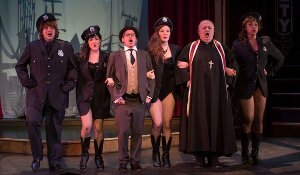
Former PM Paul Martin Jr. on Catholicism & Canadian Liberalism

Written by Deborah Rankin
Wednesday March 2nd,
Former Prime Minister Paul Martin Jr. recently gave the keynote address at McGill University's Newman Centre on his late father's life and political legacy with the Liberal Party of Canada. The RSVP event, which drew many faculty members and students, was part of the Claude Ryan Lecture Series on Catholic Social Thought. Paul Martin Sr., Catholicism & Canadian Liberalism traced a path between the Catholic spiritual and intellectual influences of Martin Sr.'s youth, beginning at Collège Saint-Alexandre in French Quebec, and his progressive politics in later years in English Canada.
Greg Donaghy, author of Grit: the Life & Politics of Paul Martin Sr. was also a keynote speaker. After being introduced by Canadian diplomat and adjunct professor in the Faculty of Religious Studies at McGill, Anne Leahy, he told the audience that Martin Sr. was no mere "local pol", as he has sometimes been mischaracterized, but someone who was "forward-looking" during the Great Depression. First published in May, , Martin Sr.'s biography examines his career as an early liberal reformer who championed mother's allowances, old age pensions, and labour's right to bargain, and a proponent of internationalism in world affairs who served as a cabinet minister under four Prime Ministers, beginning with William Lyon MacKenzie King, through many years of Liberal government with Louis St. Laurent, Lester B. Pearson and, finally, Pierre Elliott Trudeau, who subsequently appointed Martin Sr. to the Senate.
The event was as much an homage to Martin Jr. as Martin Senior. Olivier Marcil, the Vice-principal of McGill University for Communications and External Relations praised the former prime minister for his contributions to Canadian political life, noting his commitment to early childhood education, a better financial deal for municipalities, and his tireless efforts to promote the Kelowna Accord, an agreement between the federal government, provinces, territories, and five national aboriginal organizations which sought to improve the living conditions and opportunities of Aboriginal peoples through governmental programs. (The accord was endorsed by Paul Martin Jr., but not by his successor, Stephen Harper.)
Martin Jr. said that it was quite "emotional" for him to listen to Donaghy talk about the early years of his father's life, with his own three sons and grandson present, noting that they were the "three grandsons and great-grandson" of his father.
Donaghy recounted to the rapt audience how the senior Martin had contracted polio when he was only four years old, observing that the disability had "fuelled his progressive outlook". But, it was his French Canadian mother Lumina's abiding faith in prayer, he said, that had imbued the young boy with a "deep sense of Catholicity."
Donaghey noted how she had brought up her son to believe in the "nobility of public life", a calling rivalled only by the priesthood. Not surprisingly, Grit highlights the most famous statement of the consummate politician whose career spanned four decades: "I am not afraid to be called a politician," he said. "Next to preaching the word of God, there is nothing nobler than to serve one's countrymen in Government."
The Catholic faith was a point of pride for two generations of Martins. Donaghy said that Martin Sr. had to overcome resistance to the fact that he was a Catholic when he first entered politics, but the young lawyer from Windsor, Ontario, whose Irish Catholic ancestors came from County Mayo, would eventually become Secretary of State for External Affairs in the Pearson Government.
Martin Jr. paid tribute to the Newman Centre and the Catholic ideals that inspired it, recalling, tongue-in-cheek, how, when he was a university student, his father would never ask him if he had gone to Mass, but only if he had been to the Newman Club. He said the definitive debate in the Martin household when he was growing up, in Ottawa, was over which of his parents was more Catholic, a debate that would mesh with language issues. A tug of war would occur between him and his sister over which church they would attend: the English-speaking parish of St. Joseph's, run by Irish Oblates; or the French-speaking parish of the Sacred Heart. Ultimately, he and his sister both decided in favor of the English church because the sermons were shorter, he quipped, much to the delight of his audience.
A panel discussion followed the joint lecture with three academics from different disciplines weighing in on the impact of the elder Martin's legacy on Canadian politics. Media commentator and Professor of Political Science at McGill, Antonia Maioni, noted that Paul Martin Sr. had challenged the status quo of the Liberal Party in his day. He brought forward a reformist agenda she said, based on "living up to Catholic ideals", and by promoting a "more effective social liberalism", he was "increasing justice and brotherhood". But, she noted, social rights as we understand these today, would not be embedded in legal rights in Canada until Pierre Trudeau arrived on the scene.
Dr. André Blais, who holds the Canada Research Chair in Electoral Studies at Université de Montréal talked about the role of religion in electoral politics. He said it was true that the Catholic vote had accounted for "Liberal dominance" in Canadian politics for many years. This was the case between 1965-2004, despite the fact that Catholics disagreed with the Liberal Party's positions on abortion and same-sex marriage, he said. However, the link between Catholicism and Liberalism has been steadily declining since 2004 to the point where it had disappeared by 2011. He acknowledged that he couldn't really explain this phenomenon, saying he was leaving it to the next generation of researchers, "to figure out the puzzle."
Professor Daniel Cere, Interim Dean of the Faculty of Religious Studies at McGill highlighted the history of religion as a factor in determining voter preference. He reminded listeners of the days when the Catholic Church in Quebec took a dim view of liberalism, drawing attention to a letter issued by Quebec's Bishops in 1875 which decried liberalism as an "inveterate enemy of Catholicism." However, by 1877, the Vatican had written back, asking them to stop preaching to people about how they should vote. This was due, in no small part, he said, to the influence of (Sir Wilfrid) Laurier who effected a "sea change in Quebec Catholicism", allowing it to develop a "conception (of liberalism) different from Euro-liberalism." Laurier had initially embraced a more radical view of liberalism, but later eschewed it for a more moderate one which he hoped would be acceptable to Catholic clergy.
The event also drew well-known personalities such as writer Father John Walsh who sat beside Martin Jr., as well as Helen Fotopulos, a former member of the Executive Committee of the City of Montreal during former Mayor Gérald Tremblay's tenure. Veteran Canadian journalist Alan Hustak was also present, busily snapping pictures. Lucie Santoro, a former political attaché from Martin Jr.'s days in office, who is currently the Director of the Martin Aboriginal Education Initiative, greeted people before the lecture, chatting with participants afterwards at the coctail party featuring mulled wine and tasty ordoeuvres. Martin Jr.'s wife Sheila, sporting a bright pink jacket, easily mingled with the crowd, while grandson Ethan's chic-looking Mom kept a watchful eye on him.
Cere prepared a power-point presentation of Martin Sr.'s days in office which was projected on a screen so that those who chose to stay for the after-party could watch it as they milled about the Newman Centre sipping wine and soaking up the atmosphere.
Most stayed on after the lecture with the result that the affair went on for several hours. This is exactly what organizers had hoped for. Linda Diez, Administrative Coordinator for the Newman Centre said the centre strives to create a "salon-like" environment for lectures in order to foster a climate of constructive dialogue and enjoyable conversation.
Last Night at the Gayete

|
|
|
|
|
|
The Centaur Theatre's - season is drawing to a close with its final production of Last Night at the Gayety, a musical comedy by Bowser & Blue which runs until May 22nd. |
|
|


